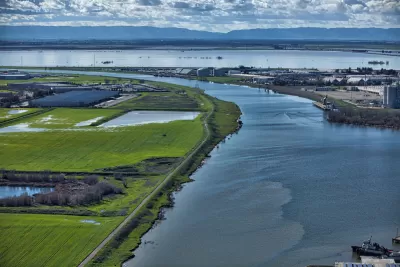California has made a practice of resisting changes to environmental regulations pursued by the Trump administration, but the latest legislative effort to protect the state's waterways was a bridge too far for the governor.

Dale Kasler and Kate Irby report on a schism in the Democratic party in California over the fate of a state bill that would have bolstered environmental protections for waterways and fish in the face of pressure from the Trump administration.
California Governor Gavin Newsom has promised to veto Senate Bill 1, according to the article.
Newsom, who has sparred repeatedly with President Donald Trump and generally sided with environmental interests since taking office in January, said he’ll veto the legislation even though he supports its general principles of keeping California’s air, water and endangered species safe. The bill would have essentially negated every environmental rule proposed by Trump, turning the regulatory clock back to Jan. 19, 2017, the day before he took office.
Meanwhile, the Trump administration is preparing additional steps to relax the state's environmental protections:
In a matter of days, the federal government is scheduled to release controversial new rules governing the movement of water through the Sacramento-San Joaquin Delta; the rules are expected to favor the delivery of additional water supplies to farmers in the San Joaquin Valley.
More on the reasoning behind Gov. Newsom's veto decision, the political fallout among other Democrats in the state, and the potential environmental consequences of the Trump administration's rule changes are included in the article.
FULL STORY: A fight with Trump that Gavin Newsom doesn’t want: Why he’s vetoing environmental bill

Alabama: Trump Terminates Settlements for Black Communities Harmed By Raw Sewage
Trump deemed the landmark civil rights agreement “illegal DEI and environmental justice policy.”

Planetizen Federal Action Tracker
A weekly monitor of how Trump’s orders and actions are impacting planners and planning in America.

Why Should We Subsidize Public Transportation?
Many public transit agencies face financial stress due to rising costs, declining fare revenue, and declining subsidies. Transit advocates must provide a strong business case for increasing public transit funding.

Understanding Road Diets
An explainer from Momentum highlights the advantages of reducing vehicle lanes in favor of more bike, transit, and pedestrian infrastructure.

New California Law Regulates Warehouse Pollution
A new law tightens building and emissions regulations for large distribution warehouses to mitigate air pollution and traffic in surrounding communities.

Phoenix Announces Opening Date for Light Rail Extension
The South Central extension will connect South Phoenix to downtown and other major hubs starting on June 7.
Urban Design for Planners 1: Software Tools
This six-course series explores essential urban design concepts using open source software and equips planners with the tools they need to participate fully in the urban design process.
Planning for Universal Design
Learn the tools for implementing Universal Design in planning regulations.
Caltrans
Smith Gee Studio
Institute for Housing and Urban Development Studies (IHS)
City of Grandview
Harvard GSD Executive Education
Toledo-Lucas County Plan Commissions
Salt Lake City
NYU Wagner Graduate School of Public Service





























